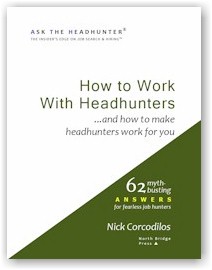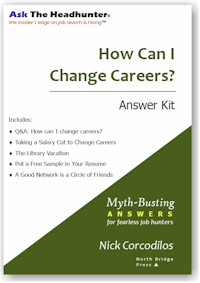|
|
|
|
Question
[A reader recently posted this on the Ask The Headhunter Blog. It's not a question, but it's very worthy of discussion.]
Nick, your comments are dead on about the HR "profession". Maybe not far enough, though.
My dad (who was in HR before it was called HR) used to say that companies ran better when it was called "Pay and Benefits," and they stuck with those tasks: Making sure the payroll envelopes had the correct amount in them at the end of the week, and making sure the benefits were competitive and not canceled. When it became Human Resources, and "professionals" started telling hiring managers who they could and could not interview, telling [the] legal [department] what was right or wrong, telling management all was well with the company—all the while keeping anyone smart enough to "get it" out of the building—is when corporate America started to go downhill.
MBA's in Chicago
Next Monday, April 19, I'll be at the University of Chicago's Booth School of Business, to give the keynote address to career center directors from the top 30 MBA and Executive MBA schools in the U.S. (plus the London Business School and INSEAD). These are the folks who advise MBA's and alumni.
The topic of my talk: The New Interview. A.k.a., do the job to win the job, the profit-based interview, the business-plan interview. This is nothing new to you if you're a long-time reader.
But I'm not just going there to speak: I'm going to listen and learn what these career folks are teaching MBA's about job hunting. I hope to come back and share it all with you. Since I'll be flying home when I should be writing the newsletter, if I'm a day or so late with the next edition, please bear with me!
— Nick |
Can't say I disagree with him.
Nick's Reply
We've discussed this subject before. Should Human Resources (HR) be in the recruiting and hiring business?
My answer has always been an emphatic no for two main reasons, though there are many others. First, HR is not as expert in the business of any department as that department itself, and thus is not the best "manager" of recruiting, candidate selection, interviewing or hiring. Second, putting these functions in the hands of HR tacitly relieves departmental managers of what I believe are two of their most crucial management tasks—finding and hiring good people.
There's a third good reason: HR has no skin in the game. It virtually doesn't matter who is recruited, processed or hired because HR gets paid regardless. It's a rare company that rewards or blames HR for the quality of hiring, yet HR is typically insulated as a "necessary overhead function" whose performance is measured only indirectly.
HR's domination of recruiting and hiring has produced a disaster of staggering magnitude in business today. You've heard it referred to as "the talent wars," and "the talent problem," and "the talent shortage."
While the economy has put massive numbers of talented workers on the street, HR nonetheless complains it can't find talent. That's no surprise when HR's idea of finding talent is to resort to database searches and keyword filtering, which are disastrously impersonal methods for finding and attracting the best hires.
The typical HR process of recruiting and hiring is most generously described as "hiring who comes along" via job boards and advertisements. It's a rare (and precious) HR worker who gets off their duff (from behind the computer display) to actually go find, meet and bring home good workers.
I could write pages about corporate maladies that arise from the reliance on HR to recruit and hire. Instead, I'm just going to list some of the ways HR can kill any company's competitive edge by interfering with these management functions:
- Job boards and similar advertisements—the high-volume, passive recruiting tools HR relies on—yield only applicants "who come along," not those the company should be pursuing.
- Good candidates are lost because database algorithms and keyword filters miss indicators of quality that are not captured by software. Clever job applicants who game the system slip through keyword filters, wasting corporate time and money. The wrong people get hired and work remains undone because HR's "hiring process" is too far removed from business units that need to hire the best people.
- HR has turned recruiting into a volume operation—the more applicants, the better. This results in impersonal, superficial reviews of candidates and quick, high-volume yes/no decisions that are prone to error.
- Soliciting far more applicants than HR can possibly process properly results in unprofessional HR behavior, angry applicants and damage to corporate reputations.
- Because HR does not report to the departments it recruits for, it tends to behave inefficiently and unaccountably with impunity. The bureaucracy grows without checks and balances, and the hiring process becomes dull, rather than honed into a true competitive edge.
- HR tends to isolate managers from the initial recruiting process, further deteriorating the already weak links between managers and the professional communities they need to recruit from.
- The complexity of corporate HR infrastructure encourages isolation and "siloing." Evidence of this is HR's over-emphasis of legal risks in hiring, and its administrative domination of a top-level business function.
- With the hiring process relegated to HR, managers often cannot hire competitively or in a timely way. Good candidates are frequently lost to the competition.
- HR owns two competing interests, further dulling a company's competitive edge: the hiring process and legal/compliance functions. Because hiring is a strategic, competitive function, it requires its own advocate. If business units and managers took full responsibility for recruiting and hiring (while HR handled compliance) the daily abrasion of these competing interests would strengthen a company's edge.
This situation didn't arise overnight. It crept up on business in the form of a smothering shroud of bureaucracy. Today this HR bureaucracy is propped up by an industry of "consultants," "professionals" and "experts" who advise corporate HR departments about how to maintain their administrative control over the key differentiator that defines any company—its people.
I don't disagree with this reader's dad. "Companies ran better when it was called Pay and Benefits." HR should get out of the recruiting and hiring business and give this strategic function back to business units and managers who design, build, manufacture, market and sell a company's products. Give recruiting and hiring back to the people who actually do the business. Who better to decide who's worth hiring? Who better to aggressively go find the people who will give the company an edge?
Please check the Readers' Forum: I'd like your input about whether HR should relinquish its recruiting and hiring functions. Have you experienced problems with HR in this regard? What do you think should be done about it? (And if you think I'm wrong, tell me why.)
Best,
Nick Corcodilos
Ask The Headhunter®
Have a question? Ask
away. Each week I'll publish a Q&A that I think readers will find
helpful. I will not publish your name if you submit a question through
this link. Please see terms
of submission below. Sorry, I cannot answer questions privately. Please do
not send me resumes; I won't read them.
|
|
|
This popular new feature is a way to talk with me directly in private.
Are you job hunting? Are you a manager trying to
hire more effectively? Maybe you work in HR and would like
new perspectives on recruiting and hiring.
Sometimes you have a question too detailed for the
newsletter, or it's confidential. I'm not a counselor, nor do I want to be. I
will not hold your hand through a job search or consult to you
for a year. Talk to Nick
enables you to ask me specific questions in short conversations privately via telephone.
Fee: $79 for half an hour, $150 for a full hour. E-mail me
your Talk to Nick request in 50 words or less. If I have room in my
schedule, I will e-mail you to arrange time to talk. (Payment: Via PayPal or major
credit card. For now, this service is available only to U.S. subscribers.)
|
|
|
This is where readers mentor one another—job hunters,
employers, HR folks. You've heard of six degrees of
separation? Well, I figure that among the many subscribers
to this newsletter you'll find one who can give you the advice
and insight you need... That's the Rule of 6. (And these are the rules.)
People who need help, advice and
introductions please submit
your request to me (50 words max, please!). I'll review and post
it in the next newsletter. Mentors will respond to you directly via your e-mail address. Mentors who want to
offer advice: Please click on the reply-to link in the yellow
box below and share your advice directly...
please cc me (mail@asktheheadhunter.com). Remember: This is for mentoring. Please don't
ask for jobs or submit job postings. Ask for advice and
insight from folks who might be able to help you!
|
|
Feedback
Did you like something you read here? Did my advice bug you? Is there a topic you'd like to see covered? Have an idea about how to improve this newsletter?
Please
let me know.
|
|
Your Subscription
You are subscribed as <:smtpto:>. Click to change your e-mail address
or to cancel your subscription.
If this is not your subscription, please do not mess with the
subscription links or you'll damage someone else's subscription data. If you'd like to sign
up to receive your own Ask The Headhunter Newsletter, please click
here to subscribe.
Delivery problems? Some newsletters never get delivered or "bounce back"
for any of several reasons including: subscribers' mailboxes are full, their e-mail service providers block or filter
the newsletter, or due to any of a number of other factors I can't control. Subscriptions will be suspended if delivery repeatedly fails.
Please set your filters to let the newsletter through.
I'm glad to help if you have a problem
with your subscription.
|
|
Syndication & Content Licensing
Ask The Headhunter features are available for newspaper and magazine
syndication via my good buddies at
Universal Press
Syndicate. Join the many newspapers that feature Ask The Headhunter,
including The Seattle Times.
Or... Does your organization need insider advice about job hunting or
hiring? Does your school want to give students and alumni an edge? Does your company want to keep job applicants "close" rather than pay to recruit them again later?
A custom Ask The Headhunter Newsletter
can help! Just ask
how.
Want to use this content some other way? You can purchase a license to use
this content legally.
Just ask.
|
|
|
|

How to Work with Headhunters
$39.95
"I have a headhunter not calling me back, so I looked in HTWWH and found exactly the answer along with good tips. Precisely the situation Nick identifies: A headhunter calls me on referral from an old colleague, makes it clear (unwittingly) that he does not know the technology, but he picks out keywords from my self-description and extols me and the job, asks for a resume (of course), and disappears. I was going to pursue him, but nah, now I'll work on more profitable things. Thanks for this book."
William Sterling
|
|
|
How to Work with Headhunters
+
How Can I Change Careers?
ORDER
BOTH of Nick's
myth-busting books
and SAVE
!
$39.95 + $12.95 = $52.90
The 2-Book Bundle is now

How Can I Change Careers?
$12.95
"This 'answer kit' is to the point and offers a smart strategy for career change... How Can I Change Careers? goes beyond the simplified and watered-down ideas in many career guides to get to the truth of what makes a career switcher a good hire."
Frank Marquardt
TriplePundit |
|
|
Readers' Comments
"Bill Gates once said, 'I’ve learned more about business from Warren Buffet than anyone else.' Nick Corcodilos is my Warren Buffett."
Kevin Kane
Oh, Yeah! I love success stories, thank you's, and examples of how Ask The Headhunter worked for you. Don't hold back:
Please share your comments.
|
|
| |
How to Say It
A reader asks How to Say It: I was interviewed but did not get the job. I've heard of cases where the right kind of thank you letter has resurrected candidates and led to other jobs in the same company. The format I've seen goes like this: "Thank you for interviewing me even if you did not hire me. I am disappointed, but I hope you'll consider me for other positions in the future." It sounds kind of hokey to me. There has to be better wording. How would you say it?
It seems simple enough to me, and very clear: I'd like to try again if you'll have me. Is there a better way to say it? Have you succeeded at getting a second chance with an employer? How did you do it? How did you say it?
Come to The Blog and share your tips!
Brazen Plug: There are over two dozen How
to Say It call-outs in
How to Work With Headhunters!
Order
now! |
Don't know How to Say It? Send
me your quandary and we'll try to tackle it! (Please don't confuse this
feature with Q&A topics, which are about advice. This is about how to say
something.)
|
|
| |
Readers' Forum
In today's Q&A: (Well, it's not a Q&A!) This week I printed comments about the corporate Human Resources function that bear thinking about. A seasoned HR manager says HR should get out of the business of hiring and recruiting and go back to making sure paychecks have the right amount of money in them.
I agree. What do you think? Can companies get by with managers doing their own recruiting and hiring? Would these functions be better served if HR stopped doing them?
I'd like to know what you think. Drop in on The Blog and post your comments!
Got a topic? Something to get off your chest? Something on which you'd like input from other readers?
Send it here.
|
|
|
|
Copyright © 2010 North Bridge Group, Inc. All rights reserved. For personal use only. Re-printing, re-distribution, re-publication or re-dissemination, including posting to news groups, is expressly prohibited. Please ask friends to
sign up for their own subscriptions.
Ask The Headhunter® and other titles are trademarks or registered trademarks of North Bridge Group, Inc. and Nick Corcodilos.
Interested in reprint rights? Please drop me a note.
Terms of submission: Your submissions make this newsletter relevant, and I welcome and encourage you to write me. When you submit questions, comments or any other correspondence, you grant me the right to edit, excerpt and
publish that material non-exclusively. That is, you are still free to do with it
as you will, but I can use it, too. In order to protect your privacy, my policy is not to publish your name if I print your questions in the Q&A section. However, since other areas of Ask The Headhunter are for sharing ideas and comments, please be aware that I may credit you
there by printing your name along with your submission. When
you submit a Rule of 6 request, you agree to let me publish your e-mail
address (it's "hidden" in a coded link) and you acknowledge the disclaimer below.
Click for full terms of service &
disclaimer. In brief: This publication is offered
as-is and without warranty of any kind. Neither North Bridge Group, Inc., nor its employees
or contributors are responsible for any loss,
injury, or damage, direct or consequential, resulting from your choosing to use any information or services presented here.
Use your judgment and do the best you can.
Thanks for subscribing to Ask The Headhunter.
If you're with the media or have a business
question please e-mail:
nick@asktheheadhunter.com.
North Bridge Group, Inc. P.O. Box 600
Lebanon, NJ 08833
about
ask a
question feedback
subscribe
www.asktheheadhunter.com
visit the blog
get nick's tweets
|
| |



